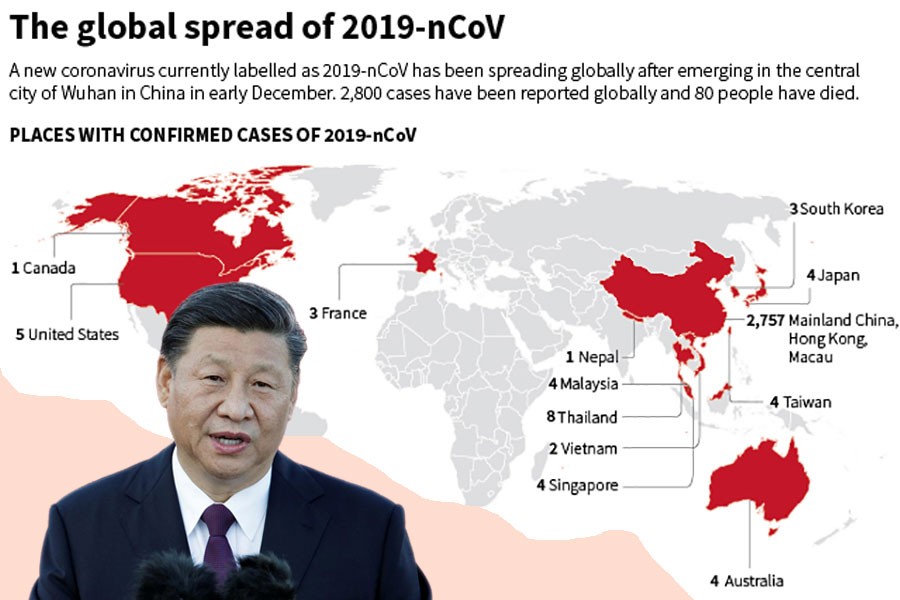Chinese President Xi Jinping has said his country will surely defeat the 'devil' coronavirus that has killed 106 people, spread across the world and rattled financial markets.
“The virus is a devil and we cannot let the devil hide,” state television quoted Xi as saying.
“China will strengthen international cooperation and welcomes the WHO participation in virus prevention ... China is confident of winning the battle against the virus.”
Despite his confidence, alarm was rising, with nations from France to Japan organising evacuations and Hong Kong - scene of anti-China unrest for months - planning to suspend high-speed rail and ferry links with the mainland.
Among countries pulling nationals out of Wuhan, the central city of 11 million people where the outbreak started, the United States’ Embassy in Beijing said a chartered plane would take its consulate staff away on Wednesday.
World Health Organisation (WHO) chief Tedros Adhanom Ghebreyesus and Xi met in Beijing to discuss how to protect Chinese and foreigners in areas affected by the virus and “possible” evacuation alternatives, a WHO spokesman said.
Investors are fretting about the impact on the world’s second-biggest economy amid travel bans and an extended Lunar New Year holiday. Global stocks fell again, oil prices hit three-month lows and China’s yuan currency dipped to its weakest in 2020.
A WHO panel of 16 independent experts twice last week declined to declare an international emergency. Traditionally, the WHO is reluctant to antagonise or ostracise countries dealing with epidemics for fear of undermining future willingness to report cases of infectious disease outbreaks.
CONTAGION
The flu-like virus has spread overseas, but none of the 106 deaths has been beyond China and all but six were in Wuhan, where the virus emerged last month, probably from illegally-traded wildlife.
The WHO said only one of 45 confirmed cases in 13 countries outside China involved human-to-human transmission, in Vietnam.
But a Japanese official said there was a suspected case of human-to-human transmission there and Germany confirmed a case after a man contracted the virus from a colleague visiting his workplace from Shanghai.
Chinese-ruled Hong Kong said high-speed rail services to the mainland will be suspended from midnight on Thursday, while the number of flights would be halved.
Thailand confirmed six more infections among visitors from China, taking its tally to 14, the highest outside China. Far eastern Russian regions would close their borders with China until Feb. 7, Tass news agency said.
Wuhan is under virtual quarantine, with a lockdown on transport and bans on gatherings. Tens of millions of others in Hubei province, of which Wuhan is the capital, live under some form of travel curbs.
The number of confirmed cases in China surged to 4,515 as of Monday from 2,835 the previous day, the government said.
Communist Party-ruled China has been eager to show it is transparent over this outbreak, after initially covering up the extent of the Severe Acute Respiratory Syndrome (SARS) epidemic that killed about 800 people globally in 2002-2003.
Known as “2019-nCoV”, the newly identified coronavirus can cause pneumonia and, like other respiratory infections, it spreads between people in droplets from coughs and sneezes. It is too early to know what its death rate will be, since there are likely to be many cases of milder disease going undetected.
It has an incubation of between one and 14 days.
Authorities in Hubei, home to nearly 60 million people, have been the focus of public outrage on China’s heavily censored social media over what many see as a bungled initial response.
In rare public self-criticism, Mayor Zhou Xianwang said Wuhan’s management of the crisis was “not good enough” and indicated he was willing to resign.
SARS, also believed to have originated in a wildlife market, led to a 45 per cent plunge in air passenger demand in Asia. The travel industry is more reliant on Chinese travellers now, and China’s share of the global economy has quadrupled.
Analysts said China’s travel and tourism would be the hardest-hit sectors, together with retail and liquor sales, though healthcare and online shopping were likely outperformers.
With Chinese markets shut for the holiday, investors were selling the offshore yuan and the Australian dollar as a proxy for risk. Oil was also under pressure as fears about the wider fallout grew.
The US S&P 500 closed down nearly 1.6 per cent.


